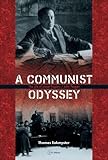A Communist Odyssey : The Life of József Pogány/John Pepper / Thomas Sakmyster.
Material type: TextPublisher: Budapest ; New York : Central European University Press, [2012]Copyright date: 2012Description: 1 online resource (265 p.)Content type:
TextPublisher: Budapest ; New York : Central European University Press, [2012]Copyright date: 2012Description: 1 online resource (265 p.)Content type: - 9786155225529
- Communism -- History -- 20th century -- Europe
- Communism -- History -- 20th century -- United States
- Communism -- Europe -- History -- 20th century
- Communism -- United States -- History -- 20th century
- Communists -- Biography -- Hungary
- Communists -- Hungary -- Biography
- BIOGRAPHY & AUTOBIOGRAPHY / Political
- 20th century, Biography, Communism, Germany, Hungary, Soviet Union, United States
- 335.43092 23
- HX260.5.A8 P657 2012eb
- online - DeGruyter
| Item type | Current library | Call number | URL | Status | Notes | Barcode | |
|---|---|---|---|---|---|---|---|
 eBook
eBook
|
Biblioteca "Angelicum" Pont. Univ. S.Tommaso d'Aquino Nuvola online | online - DeGruyter (Browse shelf(Opens below)) | Online access | Not for loan (Accesso limitato) | Accesso per gli utenti autorizzati / Access for authorized users | (dgr)9786155225529 |
Frontmatter -- Contents -- Preface -- List of Abbreviations -- CHAPTER 1 The Making of József Pogány -- CHAPTER 2 The Revolutionary, 1918–1919 -- CHAPTER 3 The Communist -- CHAPTER 4 Vienna, Moscow, and Berlin -- CHAPTER 5 The “Hungarian Christopher Columbus” -- CHAPTER 6 “Pepperism” in America -- CHAPTER 7 The Comintern Cadre -- CHAPTER 8 Pepper and the “American Question,” 1924–1928 -- CHAPTER 9 Return to the New World -- CHAPTER 10 End of the Odyssey -- Conclusion -- Bibliography -- Index -- Illustrations
restricted access online access with authorization star
http://purl.org/coar/access_right/c_16ec
A group of Central European communists, most of them Hungarians, in the interwar period served the world communist movement as international cadres of the Comintern, the Moscow-based Communist International. As an important member of this cohort, József Pogány played a major role in the Hungarian Soviet Republic of 1919, the "March Action" in Germany in 1921, and, under the name of John Pepper, in the development of the American Communist Party of the 1920s. During the 1920s he was an important official in the Comintern apparatus and undertook missions on three continents. A prolific writer and effective organizer, he was one of the most flamboyant and controversial communists of his era. Some of his comrades praised him as "the Hungarian Christopher Columbus." Others, like Trotsky, called him a "political parasite."This study is based on newly available primary sources from Hungary, Russia, and the United States; it is the first ever written about this colorful and well-travelled Hungarian communist. Examines Pogány's development as a socialist and communist, the influence of his Jewish origins on his career, the reasons for his remarkable success in the United States, and the circumstances that led to his arrest and execution in the Stalinist terror.
Mode of access: Internet via World Wide Web.
In English.
Description based on online resource; title from PDF title page (publisher's Web site, viewed 20. Nov 2024)


